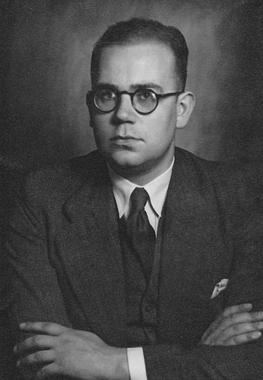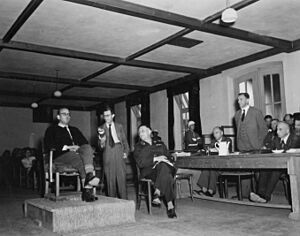Georg Konrad Morgen facts for kids
Quick facts for kids
Georg Konrad Morgen
|
|
|---|---|

A formal portrait of Morgen
|
|
| Born | 8 June 1909 |
| Died | 4 February 1982 (aged 72) |
| Other names | The Bloodhound Judge |
| SS career | |
| Allegiance | |
| Service/ |
|
| Years of service | 1933–1945 |
| Rank | Sturmbannführer |
Georg Konrad Morgen (born June 8, 1909 – died February 4, 1982) was a German lawyer and judge during World War II. He was part of the SS, a powerful group in Nazi Germany. His job was to investigate crimes that happened in the Nazi concentration camps. He reached the rank of SS-Sturmbannführer, which is like a major in the army.
After the war, Morgen helped as a witness in trials against former Nazis. He then continued his work as a lawyer in Frankfurt, Germany. He was sometimes called 'The Bloodhound Judge' because he was very determined to find out the truth and bring people to justice.
Contents
Early Life and War Service
Georg Konrad Morgen was born in Frankfurt to a railway worker. He studied law at the University of Frankfurt and The Hague Academy of International Law. After finishing his studies, he became a judge in a city called Stettin.
In 1933, he joined the Nazi Party and the SS. He was later removed from his judge position for letting a teacher go free. This teacher had been accused of being too harsh with students.
When World War II started, Morgen joined the Waffen-SS, which was the military part of the SS. He received basic military training. After the invasion of France in 1940, he left the military and became a judge again for the SS. He was sent to Kraków.
Investigating Corruption
In Kraków, Morgen started investigating high-ranking SS officers for being corrupt. This meant they were using their power for dishonest personal gain. One of the people he investigated was Hermann Fegelein, who was close to Heinrich Himmler, a very powerful Nazi leader. Morgen also found out that one of Fegelein's partners was secretly working for the Polish underground resistance.
In 1941, Morgen ordered the execution of the first German soldier, Georg von Sauberzweig. This soldier had been selling military supplies illegally.
Later, Himmler removed Morgen from his position. This might have been because Morgen was looking into things Himmler didn't want him to. As a punishment, Morgen was sent to fight on the Eastern Front.
Investigating Concentration Camps
In 1943, Himmler called Morgen back. He wanted Morgen to investigate and punish corruption within the concentration camp system. Himmler was upset that SS officers were stealing valuables from victims for themselves. He wanted these items to go to the government instead.
Morgen began his investigations at Buchenwald and Majdanek. He looked into people like Karl-Otto Koch, the camp commandant, and his wife Ilse Koch. He also investigated other SS officers and a camp doctor. They were accused of crimes like theft, not following military orders, and murder. Koch was found guilty and executed before the war ended.
Morgen also tried to get an arrest warrant for Adolf Eichmann. Eichmann was accused of taking valuable jewels from prisoners. However, Morgen's request was turned down.
In 1943, Morgen heard rumors about Christian Wirth. Wirth was in charge of the extermination centers of Operation Reinhard. Morgen found Wirth collecting huge amounts of clothing and valuables from victims. During one visit, Morgen accidentally saw the results of a terrible event called Operation Harvest Festival. This was when many Jewish labor camps in the Lublin area were shut down. About 43,000 prisoners were shot over two days. Morgen arrived the day after this terrible event.
Morgen also investigated two packages of dental gold that had been sent by an Auschwitz dental technician to his wife. Morgen realized the gold must have come from victims of the Holocaust. He sent a team to Auschwitz and visited the camp himself. He saw the killing center at Birkenau. His investigation was not popular, and a building where his evidence was stored was burned down. Even though he could not prosecute the mass killing of Jews (because it was ordered by Adolf Hitler), he still prosecuted the camp commandant Rudolf Höss and the head of the camp police, Maximilian Grabner, for other crimes, including murder.
Eventually, Heinrich Himmler stopped Morgen's investigations and gave him a different job. Some SS officials even wanted Morgen sent to a concentration camp himself.
After the War
After World War II, Georg Konrad Morgen was a witness in several important trials against Nazi war criminals. These included the famous Nuremberg trials.
Morgen later said that his investigations during the war were an attempt to stop the mass killings. Some historians believe this explanation. However, they also noted that Morgen was mainly concerned about how the concentration camp system made individuals commit crimes, rather than being against the system itself.
After the Nuremberg trials, Morgen continued his legal career in Frankfurt. He was arrested and questioned in 1946 because of his high rank in the SS. In 1948, he faced a denazification tribunal. This was a court that decided if people had been involved in Nazi crimes. Morgen argued that he became a lawyer to "serve justice" and had fought against "crimes against humanity." The court decided he was "innocent" because he had put himself at risk during his investigations. In 1950, another court classified him as a "follower" of the Nazi regime, but he remained a free man.
Morgen was also investigated three times for other accusations, including being involved in the deportation of Hungarian Jews and a medical experiment on Russian prisoners. However, there was not enough evidence to prosecute him for these.
Morgen appeared in the television series World at War. He said he could not understand why Germany kept fighting when it was clear they would lose the war. He blamed the leaders of the Nazi regime.
Georg Konrad Morgen died on February 4, 1982.
Nazis Investigated by Konrad Morgen
Morgen investigated many individuals for crimes during his time as an SS judge. Here are some of them:
- Hans Aumeier – Faced justice in Poland in 1948.
- Johann Blank – An officer at Buchenwald, he died while in custody in 1944.
- Hermann Florstedt – Commandant of Majdanek, he was sentenced to death.
- Amon Göth – Commandant of the Kraków-Płaszów concentration camp, he was removed from his position for corruption and extreme cruelty. He was later arrested by U.S. soldiers and faced justice in Poland in 1946.
- Maximilian Grabner – Head of the political section in Auschwitz, he was accused of murder and faced justice in Poland in 1948.
- Adam Grünewald – Commandant of Herzogenbusch concentration camp, he was found guilty of mistreating prisoners and sent to prison. He was later killed in action in 1945.
- Hermann Hackmann – In charge of protective custody in Majdanek, he was sentenced to death for murder but later served time in prison. He died in 1994.
- Waldemar Hoven – A doctor at Buchenwald, he was arrested for murder. He was later convicted at the Doctors' Trial and faced justice in 1948.
- Karl-Otto Koch – Commandant of Buchenwald and Majdanek, he was executed in 1945 for unauthorized murders and stealing.
- Rudolf Köhler – An officer at Buchenwald, he was murdered while in custody in 1943.
- Karl Künstler – Commandant of Flossenbürg concentration camp, he was removed for bad behavior and likely killed in action in 1945.
- Hans Loritz – Commandant of Oranienburg, he was investigated for arbitrary killings and died in custody in 1946.
- Alexander Piorkowski – Commandant of the Dachau concentration camp, he was accused of murder and faced justice in 1948.
- Georg von Sauberzweig - He was accused of selling military supplies illegally and was executed in 1941.
- Martin Sommer – An officer at Buchenwald, he was known for his cruelty. He was sentenced to a penal unit, wounded in battle, and later served time in prison. He died in 1988.
Images for kids




